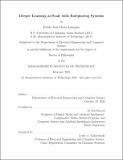Deeper learning at scale with roleplaying systems
Author(s)
Ortiz-Lampier, Pablo José.
Download1252061867-MIT.pdf (9.722Mb)
Other Contributors
Massachusetts Institute of Technology. Department of Electrical Engineering and Computer Science.
Advisor
D. Fox Harrell.
Terms of use
Metadata
Show full item recordAbstract
Contemporary online learning systems are increasingly important and common elements of post-secondary, workplace, and lifelong education. The current state is that these systems typically employ the banking model of education to educate learners. While this method is quite effective for teaching foundational knowledge, it is ill-suited for fostering deeper learning, "...an umbrella term for the skills and knowledge that students must possess to succeed in 21st century jobs and civic life..." [218] including, among other things, critical thinking. To meet learners' growing needs, we must go beyond the banking model of education and advance the state of the art. As a step toward this goal, I investigated how one might design online learning systems to scalably support critical thinking. Reflection, when not treated synonymously with critical thinking, is often cited as a key component of critical thinking. Thus, by working to support reflection in online learning systems, I work to support critical thinking skills at scale and, by extension, deeper learning. This dissertation contributes (1) a framework, grounded in roleplay theory & practice, for designing online learning systems that scalably support reflection, (2) novel systems that exemplify and operationalize this framework, (3) a method for effectively evaluating reflection at scale, and (4) an evaluation of the novel systems and design framework in terms of their ability to support reflection.
Description
Thesis: Ph. D., Massachusetts Institute of Technology, Department of Electrical Engineering and Computer Science, February, 2021 Cataloged from the official PDF of thesis. Includes bibliographical references (pages 201-221).
Date issued
2021Department
Massachusetts Institute of Technology. Department of Electrical Engineering and Computer SciencePublisher
Massachusetts Institute of Technology
Keywords
Electrical Engineering and Computer Science.